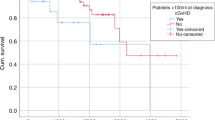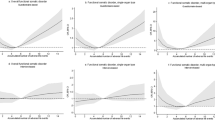Abstract
The influence of personality on health related quality of life (QoL) and physical functioning in the setting of allogeneic hematopoietic SCT (alloHSCT) is unknown. We conducted a joint evaluation within two independent cohorts of alloHSCT recipients to investigate the impact of personality on reported QoL and physical functioning. Two-hundred-eight patients (median age 44 years, range 18–72) of cohort 1 and 93 patients (median age 55 years, range 19–79) of cohort 2 after alloHSCT were evaluated. Personality was assessed using the 24-adjective measure (AM), which measures the Big-Five personality domains and the Life Orientation Test—Revised (LOT-R), measuring optimism and pessimism. QoL was measured using the Functional Assessment of Cancer Therapy with bone marrow transplantation subscale (FACT-BMT), Short Form 36 (SF-36), the human activity profile (HAP), as well as the NIH criteria-based cGVHD activity assessment form and the Lee cGVHD symptom scale. Neuroticism was significantly associated with worse function measured by the HAP and FACT-BMT. Optimism significantly improved QoL captured by the FACT-BMT. Pessimism significantly impaired physical function captured by the HAP and SF-36. Extraversion was significantly associated with reduced depression and lower severity of cGVHD symptoms reported by the patient and the physician. The results suggest that personality traits and pre-treatment QoL assessments should be measured in clinical trials to facilitate the interpretation of QoL data.
This is a preview of subscription content, access via your institution
Access options
Subscribe to this journal
Receive 12 print issues and online access
$259.00 per year
only $21.58 per issue
Buy this article
- Purchase on Springer Link
- Instant access to full article PDF
Prices may be subject to local taxes which are calculated during checkout

Similar content being viewed by others
References
Fraser CJ, Bhatia S, Ness K, Carter A, Francisco L, Arora M et al. Impact of chronic graft-versus-host disease on the health status of hematopoietic cell transplantation survivors: a report from the Bone Marrow Transplant Survivor Study. Blood 2006; 108: 2867–2873.
Lee SJ, Kim HT, Ho VT, Cutler C, Alyea EP, Soiffer RJ et al. Quality of life associated with acute and chronic graft-versus-host disease. Bone Marrow Transplant 2006; 38: 305–310.
Mitchell SA, Leidy NK, Mooney KH, Dudley WN, Beck SL, Lastayo PC et al. Determinants of functional performance in long-term survivors of allogeneic hematopoietic stem cell transplantation with chronic graft-versus-host disease (cGVHD). Bone Marrow Transplant 2010; 45: 762–769.
Herzberg PY, Heussner P, Mumm FH, Horak M, Hilgendorf I, von HS et al. Validation of the human activity profile questionnaire in patients after allogeneic hematopoietic stem cell transplantation. Biol Blood Marrow Transplant 2010; 16: 1707–1717.
Acquadro C, Berzon R, Dubois D, Leidy NK, Marquis P, Revicki D et al. Incorporating the patient's perspective into drug development and communication: an ad hoc task force report of the Patient-Reported Outcomes (PRO) Harmonization Group meeting at the Food and Drug Administration, February 16, 2001. Value.. Health 2003; 6: 522–531.
Lee S, Cook EF, Soiffer R, Antin JH . Development and validation of a scale to measure symptoms of chronic graft-versus-host disease. Biol Blood Marrow Transplant 2002; 8: 444–452.
Pavletic SZ, Martin P, Lee SJ, Mitchell S, Jacobsohn D, Cowen EW et al. Measuring therapeutic response in chronic graft-versus-host disease: National Institutes of Health Consensus Development Project on Criteria for Clinical Trials in Chronic Graft-versus-Host Disease: IV. Response Criteria Working Group report. Biol Blood Marrow Transplant 2006; 12: 252–266.
Mitchell S, Reeve B . Health-related quality of life in chronic graft-versus-host disease. In: Vogelsang G, Pavletic S (eds). Chronic Graft-versus-Host Disease - Interdisciplinary management. Cambridge University Press: Cambridge, 2009 pp 335–348.
Aarstad AK, Aarstad HJ, Olofsson J . Personality and choice of coping predict quality of life in head and neck cancer patients during follow-up. Acta Oncol 2008; 47: 879–890.
Blank TO, Bellizzi KM . After prostate cancer: predictors of well-being among long-term prostate cancer survivors. Cancer 2006; 106: 2128–2135.
Steel P, Schmidt J, Shultz J . Refining the relationship between personality and subjective well-being. Psychol Bull 2008; 134: 138–161.
Den Oudsten BL, Van Heck GL, van der Steeg AF, Roukema JA, de VJ . Personality predicts perceived availability of social support and satisfaction with social support in women with early stage breast cancer. Support. Care Cancer 2010; 18: 499–508.
Petersen LR, Clark MM, Novotny P, Kung S, Sloan JA, Patten CA et al. Relationship of optimism-pessimism and health-related quality of life in breast cancer survivors. J Psychosoc Oncol 2008; 26: 15–32.
Prihodova L, Nagyova I, Rosenberger J, Roland R, van Dijk JP, Groothoff JW . Impact of personality and psychological distress on health-related quality of life in kidney transplant recipients. Transpl Int 2010; 23: 484–492.
Siassi M, Weiss M, Hohenberger W, Losel F, Matzel K . Personality rather than clinical variables determines quality of life after major colorectal surgery. Dis Colon Rectum 2009; 52: 662–668.
Zhang SJ, Huang LH, Wen YL, Hu ZH, Jin J, Shen LH et al. Impact of personality and coping mechanisms on health related quality of life in liver transplantation recipients. Hepatobiliary Pancreat Dis Int 2005; 4: 356–359.
Stone SV, McCrae RR . Personality and health. In: Ayers S, Baum A, MacManus C, Newman S, Wallston K, Weinmann J (eds). Cambridge Handbook of Psychology, Health and Medicine. Cambridge University Press: Cambridge, 2007 pp 151–155.
John OP, Srivastava S . The big five trait taxonomy: History, measurement, and theoretical perspectives. In: Pervin LA, John OP (eds). Handbook of personality theory and research. Guilford Press: New York, 1999 pp 102–138.
Costa PT, McCrae RR . Stability and change in personality assessment: the revised NEO Personality Inventory in the year 2000. J Pers Assess 1997; 68: 86–94.
Herzberg PY, Brähler E . Assessing the Big-Five personality domains via short forms: a cautionary note and a proposal. Eur J Psychol Assess 2006; 22: 139–148.
Filipovich AH, Weisdorf D, Pavletic S, Socie G, Wingard JR, Lee SJ et al. National Institutes of Health consensus development project on criteria for clinical trials in chronic graft-versus-host disease: I. Diagnosis and staging working group report. Biol Blood Marrow Transplant 2005; 11: 945–956.
McQuellon RP, Russell GB, Cella DF, Craven BL, Brady M, Bonomi A et al. Quality of life measurement in bone marrow transplantation: development of the Functional Assessment of Cancer Therapy-Bone Marrow Transplant (FACT-BMT) scale. Bone Marrow Transplant 1997; 19: 357–368.
Fix AJ, Daughton DM Human Activity Profile: Professional Manual. Psychological Assessment Resources, Inc: Odessa, FL, 1988.
Bullinger M, Alonso J, Apolone G, Leplege A, Sullivan M, Wood-Dauphinee S et al. Translating health status questionnaires and evaluating their quality: the IQOLA Project approach. International Quality of Life Assessment. J Clin Epidemiol 1998; 51: 913–923.
Herzberg PY, Glaesmer H, Hoyer J . Separating optimism and pessimism: a robust psychometric analysis of the revised Life Orientation Test (LOT-R). Psychol Assess 2006; 18: 433–438.
Scheier MF, Carver CS, Bridges MW . Distinguishing optimism from neuroticism (and trait anxiety, self-mastery, and self-esteem): a reevaluation of the Life Orientation Test. J Pers Soc Psychol 1994; 67: 1063–1078.
Herrmann-Lingen C, Buss U, Snaith RP . Hospital Anxiety and Depression Scale - Deutsche Version. Hofgrefe: Göttingen, 1995.
Zigmond AS, Snaith RP . The hospital anxiety and depression scale. Acta Psychiatr Scand 1983; 67: 361–370.
Cohen J . Statistical Power Analysis for the Behavioral Sciences. Erlbaum: Hillsdale, NJ, 1988.
Revicki DA, Osoba D, Fairclough D, Barofsky I, Berzon R, Leidy NK et al. Recommendations on health-related quality of life research to support labeling and promotional claims in the United States. Qual Life Res 2000; 9: 887–900.
Paika V, Almyroudi A, Tomenson B, Creed F, Kampletsas EO, Siafaka V et al. Personality variables are associated with colorectal cancer patients' quality of life independent of psychological distress and disease severity. Psychooncology 2010; 19: 273–282.
Grov EK, Fossa SD, Bremnes RM, Dahl O, Klepp O, Wist E et al. The personality trait of neuroticism is strongly associated with long-term morbidity in testicular cancer survivors. Acta Oncol 2009; 48: 842–849.
Hartl K, Engel J, Herschbach P, Reinecker H, Sommer H, Friese K . Personality traits and psychosocial stress: quality of life over 2 years following breast cancer diagnosis and psychological impact factors. Psychooncology 2010; 19: 160–169.
Connor-Smith JK, Flachsbart C . Relations between personality and coping: a meta-analysis. J Pers Soc Psychol 2007; 93: 1080–1107.
Horney DJ, Smith HE, McGurk M, Weinman J, Herold J, Altman K et al. Associations between quality of life, coping styles, optimism, and anxiety and depression in pretreatment patients with head and neck cancer. Head Neck 2011; 33: 65–71.
Novotny P, Colligan RC, Szydlo DW, Clark MM, Rausch S, Wampfler J et al. A pessimistic explanatory style is prognostic for poor lung cancer survival. J Thorac Oncol 2010; 5: 326–332.
Goetzmann L, Ruegg L, Stamm M, Ambuhl P, Boehler A, Halter J et al. Psychosocial profiles after transplantation: a 24-month follow-up of heart, lung, liver, kidney and allogeneic bone-marrow patients. Transplantation 2008; 86: 662–668.
Kung S, Rummans TA, Colligan RC, Clark MM, Sloan JA, Novotny PJ et al. Association of optimism-pessimism with quality of life in patients with head and neck and thyroid cancers. Mayo Clin Proc 2006; 81: 1545–1552.
Pinquart M, Frohlich C, Silbereisen RK . Optimism, pessimism, and change of psychological well-being in cancer patients. Psychol Health Med 2007; 12: 421–432.
Brenes GA, Rapp SR, Rejeski WJ, Miller ME . Do optimism and pessimism predict physical functioning? J Behav Med 2002; 25: 219–231.
Scheier MF, Helgeson VS, Schulz R, Colvin S, Berga SL, Knapp J et al. Moderators of interventions designed to enhance physical and psychological functioning among younger women with early-stage breast cancer. J Clin Oncol 2007; 25: 5710–5714.
Acknowledgements
We would like to thank Steven Z Pavletic for scientific advice in the design of the study and preparation of the manuscript. Daniel Wolff and Ernst Holler have been supported by a grant from the Jose Carreras Foundation project ‘Competence center GvHD Regensburg’.
Author information
Authors and Affiliations
Corresponding author
Ethics declarations
Competing interests
The authors declare no conflict of interest.
Rights and permissions
About this article
Cite this article
Herzberg, P., Lee, S., Heussner, P. et al. Personality influences quality-of-life assessments in adult patients after allogeneic hematopoietic SCT: results from a joint evaluation of the prospective German Multicenter Validation Trial and the Fred Hutchinson Cancer Research Center. Bone Marrow Transplant 48, 129–134 (2013). https://doi.org/10.1038/bmt.2012.83
Received:
Revised:
Accepted:
Published:
Issue Date:
DOI: https://doi.org/10.1038/bmt.2012.83
Keywords
This article is cited by
-
Post-transplant multimorbidity index and quality of life in patients with chronic graft-versus-host disease—results from a joint evaluation of a prospective German multicenter validation trial and a cohort from the National Institutes of Health
Bone Marrow Transplantation (2021)
-
Clinical, social, and psycho-oncological needs of adolescents and young adults (AYA) versus older patients following hematopoietic stem cell transplantation
Journal of Cancer Research and Clinical Oncology (2021)
-
Altered immune reconstitution of B and T cells precedes the onset of clinical symptoms of chronic graft-versus-host disease and is influenced by the type of onset
Annals of Hematology (2017)
-
Physical and psychosocial aspects of adolescent and young adults after allogeneic hematopoietic stem-cell transplantation: results from a prospective multicenter trial
Journal of Cancer Research and Clinical Oncology (2017)
-
Predictors of health-related quality of life in neurosurgical brain tumor patients: focus on patient-centered perspective
Acta Neurochirurgica (2014)



